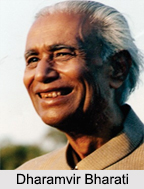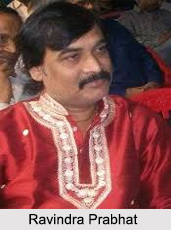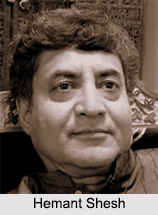 Literature is a part of the heritage of India. Indian literature exists in varied languages. Various Indians skilled in writing have contributed in creating this part of India"s heritage in the form of stories, novels, prose, essays, etc. with varied languages. Hindi language literature is no exception in this regard. A noteworthy aspect of this literature is poetry written by eminent poets. Some of these poets and their works are described and mentioned below.
Literature is a part of the heritage of India. Indian literature exists in varied languages. Various Indians skilled in writing have contributed in creating this part of India"s heritage in the form of stories, novels, prose, essays, etc. with varied languages. Hindi language literature is no exception in this regard. A noteworthy aspect of this literature is poetry written by eminent poets. Some of these poets and their works are described and mentioned below.
Chand Bardai
Born in 1149, in Lahore, Chand Bardai was an exceptional Hindi poet who holds the distinction of being the `First Hindi Poet.` His magnum opus, "Prithviraj Raso," is hailed as the first composition in Hindi literature. Not only is it the first, but it is also the largest Hindi writing, containing over 10,000 verses. The composition showcases Bardai`s mastery of language, as it incorporates elements from six contemporary existing languages. The "Prithviraj Raso" stands as a monumental work, immortalizing the legendary Rajput king Prithviraj Chauhan.
Kabir Das
Sant Kabir, the renowned mystic poet of the 15th century was born near Varanasi (former Benaras). He possessed a unique blend of humanism that transcended religious boundaries and offered his own interpretation of God. In his compositions, Kabir Das refers to Ramananda as his Lord. Despite being illiterate, Sant Kabir possessed immense wisdom and knowledge. His writing style was remarkable, characterized by its down-to-earth nature, concise yet powerful expressions, and vivid imagery. He conveyed his poetic creations orally in Hindi, employing local dialects such as Awadhi, Braj, and Bhojpuri. Among his notable works, the "Bijak" (The Seedling) stands as a profound collection of poems showcasing his spiritual insights.
 Tulsidas
Tulsidas
Goswami Tulsidas, a revered Hindi poet hailing from the spiritual city of Varanasi, was not only a philosopher and saint but also a devoted follower of Lord Shri Ram in the Ramanandi Sampradaya. In 1574, Tulsidas embarked on his literary journey, producing compositions of great literary value. However, his magnum opus, the Ramcharitmanas, surpassed all his previous works. It comprises beautiful `Chaupai` dedicated solely to Lord Rama. In addition to it, Tulsidas authored five longer compositions and six shorter ones, including the Dohavali, Kavitavali, Gitavali, Krishnavali, Vinay Patrika, and Hanuman Chalisa, all considered masterpieces.
Ramdhari Singh Dinkar
Ramdhari Singh Dinkar possessed a remarkable skill for expressing profound meanings using simple language. His deeply patriotic poetry, written before India`s independence, earned him the esteemed title of `National Poet.` Dinkar`s early life was marred by poverty, having been born into a humble Brahmin family in Begusarai, Bihar. However, his challenging upbringing served as a catalyst, shaping him into an extraordinary Hindi poet and writer. In 1924, his poetic talent made its debut with the publication of "Chhatra Scholar" in a local newspaper.
Suryakant Tripathi a.k.a. Nirala
The name `Nirala` aptly captures the essence of this exceptional Hindi poet, whose writings encompassed various genres and themes. Suryakant Tripathi `Nirala,` born in 1896, in Midnapur, Bengal, received his primary education in Bengali. He excelled as a Hindi poet, novelist, essayist, and played a pivotal role in pioneering the Chhayavaad (Neo-Romantic) movement in Hindi literature. In 1923, he published his first poetry collection, "Anamika," marking the beginning of his literary career.

Jaishankar Prasad
Jaishankar Prasad, born on January 30, 1889, was a prominent Hindi poet and a revered figure in modern Hindi literature and theatre. Initially writing under the pen name "Kaladhar," he published his first poetry collection, "Chitradhar," in the Braj dialect of Hindi. However, his later works were written in Sanskritized Hindi or the Khadi dialect. Jaishankar Prasad was among the well-known Hindi poets of his time and is considered one of the Four Pillars of Romanticism in Hindi Literature alongside Mahadevi Verma, Sumitranandan Pant, and Suryakant Tripathi `Nirala`.
Mahadevi Verma
Mahadevi Verma, often referred to as the "Modern Meera," was a legendary Hindi poet, writer, and novelist who witnessed India`s transformation both before and after independence. She was among the Hindi poets who dedicated their work to the betterment of Indian society. Her poetry beautifully portrayed not only her literary prowess but also her deep commitment to social upliftment and women`s welfare. Alongside her poetic talent, Verma showcased her skills as a painter and adept translator. Mahadevi Verma has been honoured with Padma Bhushan (1956), Sahitya Akademi Fellowship (1979), Jnanpith Award (1982), and Padma Vibhushan (1988).
Harivansh Rai Bachchan
Harivansh Rai Bachchan, widely acclaimed for his immortal creation "Madhushala," was a renowned Hindi poet whose poetry and writings held an irresistible allure for the audience. His words possessed the remarkable ability to evoke emotions and truly connect with readers, showcasing his exceptional talent as a writer. Born in 1907, Bachchan hailed from Allahabad, Uttar Pradesh. He graduated from Allahabad University in 1929 and subsequently became a Research Scholar there. In 1941, he joined the university as a Lecturer in English Literature before pursuing further studies at Cambridge University. Bachchan Ji holds the distinction of being the first Indian to earn a Ph.D. in English Literature from Cambridge University.
Maithili Sharan Gupt
Born on August 3, 1886, Maithili Sharan Gupt was a prominent figure in modern Hindi poetry and is widely regarded as one of the foremost apostles of Khari Boli Poetry. He primarily wrote in the same dialect and made significant contributions to its development. Recognizing his literary prowess and nationalistic spirit, Mahatma Gandhi bestowed upon him the title of "Rashtra Kavi" (National Poet). Gupt`s poetic works continue to hold immense significance and influence in Hindi literature, solidifying his place as one of the most significant modern Hindi poets.
Makhanlal Chaturvedi
Pandit Makhanlal Chaturvedi, born in 1889, was an extraordinary Hindi poet, writer, essayist, playwright, and journalist. He emerged as a prominent figure during the Indian National Struggle and made significant contributions to the Chhayavaad movement of Neo-Romantic Hindi Literature. Hailing from the Hoshangabad District of Madhya Pradesh, this remarkable poet was affectionately referred to as `Pandit Ji.` His literary prowess and impactful contributions were recognized when he became the first recipient of the Sahitya Akademi Award in Hindi in 1955.
Abdul Rahim Khan-e- Khana
Rahim, also known as Khanzada Mirza Khan Abdul Rahim, was a renowned Hindi poet from the Mughal era. He held a prominent position in Emperor Akbar`s court as one of the nine jewels, or "Navratnas." Born in Delhi in 1556, Rahim gained recognition for his profound couplets, known as dohe, and his expertise in astrology, as evident in his astrological books. Not only was Rahim a gifted poet, but he also showcased his linguistic abilities by translating Babur`s memoir, `Baburnama,` from Chagatai to Persian. Additionally, he displayed a remarkable command of the Sanskrit language in his two astrology books, `Khet Kautukam` and `Dwatrinsha Yogavali.`
Bharatendu Harishchandra
Bharatendu, born in 1850, hailed from the Agarwal caste in Benaras. His father, Gopal Chandra, being a poet, created an ideal environment for the growth and learning of a future Hindi poet. Bharatendu`s contributions extended beyond poetry, as he delved into writing dramas, life sketches, travel accounts, and introduced innovative mediums such as reports, publications, letters to the editor, translations, and other literary works. Revered as the Father of Hindi Literature and Hindi Theatre, Bharatendu Ji played a pivotal role in shaping the Hindi literary landscape.
Gulzar
Born in 1934, into a Sikh family in Dina, Jhelum District, British India (now Pakistan), Gulzar Saab, originally named Sampoorna Singh Kalra, is an extraordinary Hindi poet, Indian lyricist, author, screenwriter, and film director. He embarked on his career as a lyricist under the guidance of S.D. Burman. In April 2013, he was honored with the appointment as the Chancellor of Assam University. Gulzar`s multifaceted contributions to the world of arts and literature have garnered immense recognition and admiration.
Premchand
This name is a universal favorite among all generations as millions have delved into his captivating and thought-provoking stories such as "Do Bailon Kee Katha," "Premachand Ke Phate Joote," "Idgah," and more. Munshi Premchand, born on July 31, 1880, was an Indian author who fearlessly portrayed the societal evils and stereotypes through his unique writing style. Originally named Dhanpat Rai Shrivastava, he chose the pen name `Nawab Rai` initially but ultimately settled on `Premchand,` with the prefix `Munshi` bestowed upon him in recognition of his literary prowess. Munshi Premchand`s contributions to literature have left an indelible mark, captivating readers with his powerful narratives.
Sumitranandan Pant
Sumitranandan Pant is the recipient of Padma Bhushan (the third-highest civilian award in the Republic of India) and Padma Vibhushan (the second-highest civilian award in the Republic of India). This progressive left-wing 20th century poet of Hindi language added the flavor of romanticism to his poems which was inspired by nature, people and beauty within. He is known to be one of the major poets of the Chhayavaadi school of Hindi literature. Some of his famous poems are Angoothita, Bharatmata Gramvasini, Main sabse chhoti hun and Maun Nimantran.
Dharamvir Bharati
Dharamvir Bharati is the recipient of Padma Shree, the fourth highest civilian award in the Republic of India for literature. It is therefore easy to comprehend the expertise of Bharati in writing Hindi poetry. He had also explored himself as an essayist, novelist, playwright, an editor, translator and a social thinker of India. Kanupriya, Thanda Loha, Saat Geet Varsh and Sapana Abhi Bhi are known to be his famous poetry. Bharati has also contributed to "Andha Yug" (The Age of Blindness), a poetic play to Indian literature.
Suryakumar Pandey
Suryakumar Pandey is the recipient of awards like Kaka Hathrasi Puraskar, Soor Purskar and Sohanlal Dwivedi Samman. He specializes as a Hindi poet, humorist and satirist. He is especially known for his humorous Hindi poetry. Pandey has also written Bal Kavita (Hindi Children Rhymes) and his poems are part of many school books in India. Suryakumar Pandey has written more than 20 books in different genres of Hindi literature. Some of the books which he has authored are Waah Waah, Chikne Ghade and Pandeyji ke Thahake.
Ravindra Prabhat
Ravindra Prabhat is recognized as a Hindi poet, novelist, short story writer and journalist. He has also explored himself as an editor and screenplay writer. Prabhat has contributed poems like Ham Safar, Mat Rona Ramjani Chacha and Smriti Shesh to the repertoire of Hindi literature. He has also created books of fiction (like Taki Bacha Rahe Loktantra), non-fiction (like Contemporary Nepali Literature), documentaries and magazines (like Urvija).













